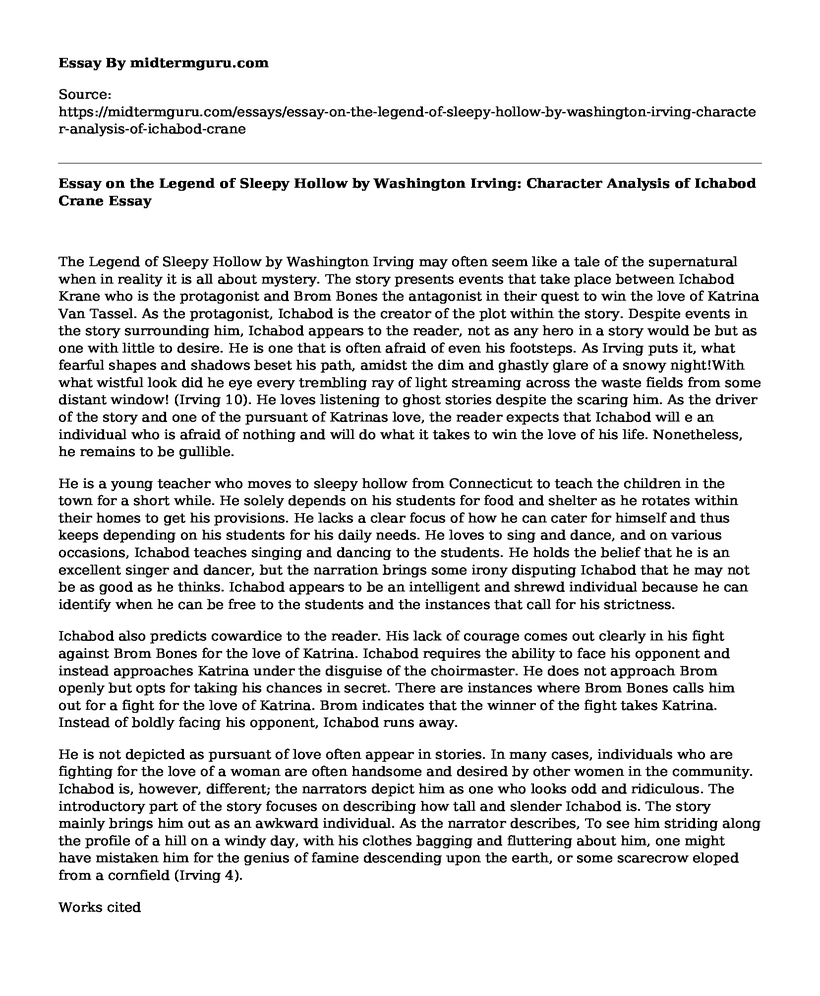The Legend of Sleepy Hollow by Washington Irving may often seem like a tale of the supernatural when in reality it is all about mystery. The story presents events that take place between Ichabod Krane who is the protagonist and Brom Bones the antagonist in their quest to win the love of Katrina Van Tassel. As the protagonist, Ichabod is the creator of the plot within the story. Despite events in the story surrounding him, Ichabod appears to the reader, not as any hero in a story would be but as one with little to desire. He is one that is often afraid of even his footsteps. As Irving puts it, what fearful shapes and shadows beset his path, amidst the dim and ghastly glare of a snowy night!With what wistful look did he eye every trembling ray of light streaming across the waste fields from some distant window! (Irving 10). He loves listening to ghost stories despite the scaring him. As the driver of the story and one of the pursuant of Katrinas love, the reader expects that Ichabod will e an individual who is afraid of nothing and will do what it takes to win the love of his life. Nonetheless, he remains to be gullible.
He is a young teacher who moves to sleepy hollow from Connecticut to teach the children in the town for a short while. He solely depends on his students for food and shelter as he rotates within their homes to get his provisions. He lacks a clear focus of how he can cater for himself and thus keeps depending on his students for his daily needs. He loves to sing and dance, and on various occasions, Ichabod teaches singing and dancing to the students. He holds the belief that he is an excellent singer and dancer, but the narration brings some irony disputing Ichabod that he may not be as good as he thinks. Ichabod appears to be an intelligent and shrewd individual because he can identify when he can be free to the students and the instances that call for his strictness.
Ichabod also predicts cowardice to the reader. His lack of courage comes out clearly in his fight against Brom Bones for the love of Katrina. Ichabod requires the ability to face his opponent and instead approaches Katrina under the disguise of the choirmaster. He does not approach Brom openly but opts for taking his chances in secret. There are instances where Brom Bones calls him out for a fight for the love of Katrina. Brom indicates that the winner of the fight takes Katrina. Instead of boldly facing his opponent, Ichabod runs away.
He is not depicted as pursuant of love often appear in stories. In many cases, individuals who are fighting for the love of a woman are often handsome and desired by other women in the community. Ichabod is, however, different; the narrators depict him as one who looks odd and ridiculous. The introductory part of the story focuses on describing how tall and slender Ichabod is. The story mainly brings him out as an awkward individual. As the narrator describes, To see him striding along the profile of a hill on a windy day, with his clothes bagging and fluttering about him, one might have mistaken him for the genius of famine descending upon the earth, or some scarecrow eloped from a cornfield (Irving 4).
Works cited
Irving, Washington. "THE LEGEND OF SLEEPY HOLLOW." 1- 26
Irving, Washington. The legend of sleepy hollow. Xist Publishing, 2015. 1- 44
Cite this page
Essay on the Legend of Sleepy Hollow by Washington Irving: Character Analysis of Ichabod Crane. (2021, Jun 04). Retrieved from https://midtermguru.com/essays/essay-on-the-legend-of-sleepy-hollow-by-washington-irving-character-analysis-of-ichabod-crane
If you are the original author of this essay and no longer wish to have it published on the midtermguru.com website, please click below to request its removal:
- Use of Styles by Writers - Paper Example
- Critical Analysis of Theories: A Doll's House - Literature Essay Sample
- Newspaper Article on The Great Gatsby - Essay Sample
- Literature Essay on Born Bad by Sandra Cisneros
- Essay Sample on Pastoral Understanding of "From the Porch" John Koethe and Thylias Moss "Tornados"
- Essay Sample on England's First Feminist Mary Astell
- Literary Analysis Essay on Macbeth: Imagery







